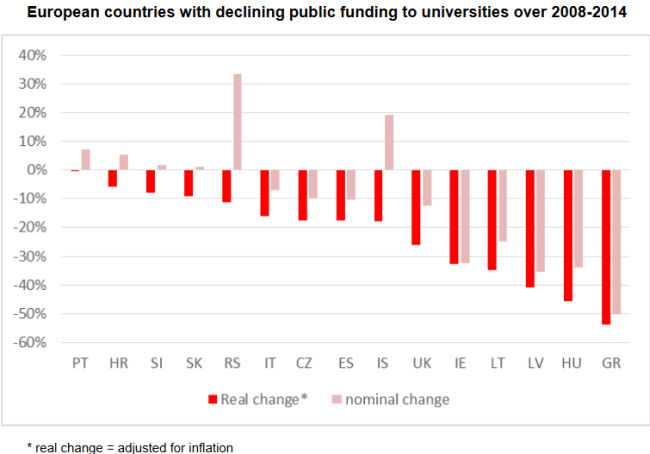Education and Science, EU – Baltic States, Investments, Legislation
International Internet Magazine. Baltic States news & analytics
Friday, 19.04.2024, 06:16
One year of EFSI: no benefit for universities
 Print version
Print version
In June 2015, the European Commission (EC) set up EFSI with the aim to mobilise private investment, ensure that investments reach the real economy and to improve the investment environment at European and national levels. In order to establish EFSI, 2.2 billion euros were taken from Horizon 2020, the EU's current framework programme for research and innovation, whose important beneficiaries are European universities.
While an EUA campaign warned against a shift of money from the highly-successful grant funding programme (see EUA policy brief, March 2015), the European Commission justified the cuts by arguing that EFSI would also benefit universities and research. EUA analysed to what extent EFSI has done this and, according to the EUA review, universities do not seem to be benefitting at all from the funding scheme.

The analysis shows that 77% of EFSI financing has gone to infrastructure development in different sectors and to SME support. Meanwhile, only 23% was awarded to research, development and innovation – but seemingly not to universities. Therefore, according to the review, EFSI has failed to bring universities and industry closer together within joint research and development projects, as originally promised.
“Appropriate infrastructure is undoubtedly an important key condition also for academic research, but public investment is needed for both and should not be taken away from one to fund the other,” explained Thomas Estermann, Director for Governance, Funding & Public Policy Development at EUA. “Horizon 2020 is a highly successful programme but is in danger of losing attractiveness if not sufficiently and sustainably funded. We’re already seeing highly-rated proposals being turned down as application success rates decline due to limited funding. This translates into inefficient high costs and lost scientific discoveries.”
In its statement, EUA points out three reasons why EFSI as a loan scheme is not suited to support collaborative university research in the current climate of declining national public funding and considering that many universities are not even allowed to take out loans. Meanwhile, such collaborative research is highly needed to address current societal challenges, foster sustainable economic recovery and find innovative solutions to the problems Europe is facing.
Given the results of the review, EUA calls upon the European Commission, the European Parliament and the Council to:
• avoid taking any more money from Horizon 2020 and feed unused money from EFSI back to those parts that foster basic and collaborative research through grants.
• increase highly-successful grant funding programmes to fund academic research and education instead of further developing financial instruments and loan-schemes.
• continue the EFSI initiative only if it really delivers on the assumed leverage effect and proves to unleash private investment.
To read “One year of EFSI: What's in it for universities? An EUA review”, please click here.








 «The Baltic Course» Is Sold and Stays in Business!
«The Baltic Course» Is Sold and Stays in Business!

